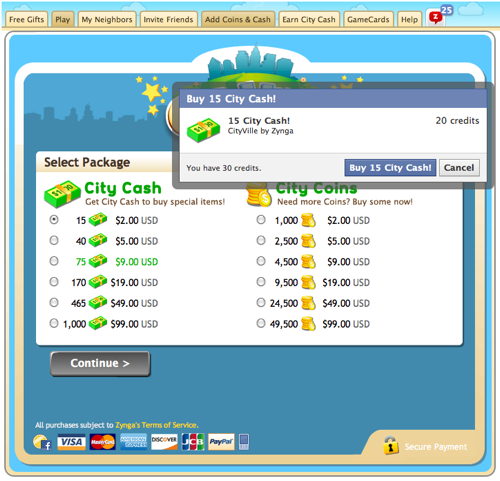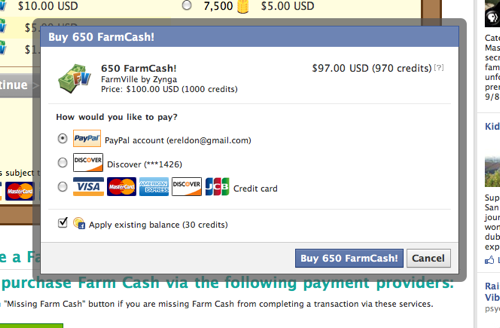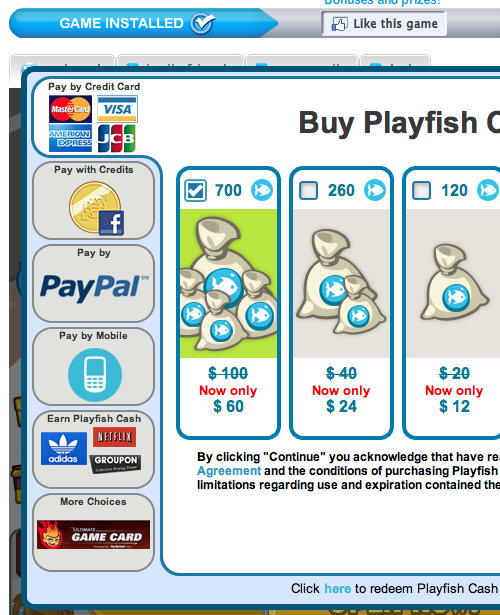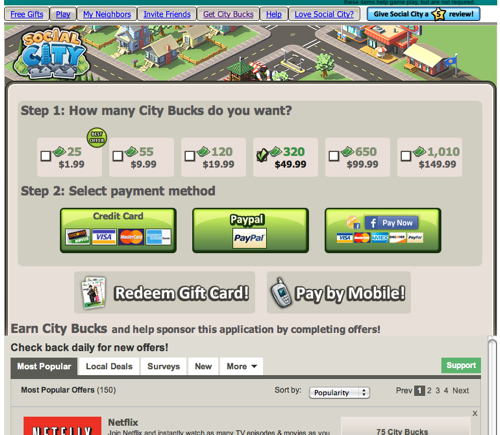Facebook Credits入驻CityVille等多款热门社交游戏
在过去的一年中,Facebook一直致力于将Credits塑造成该社交网站的唯一通用支付方式。以下,Facebook公司首席开发者和平台供应商们将与我们分享Credits的2011发展方向。
据游戏邦了解,在过去的一年中Facebook几乎与所有主流游戏开发公司签署了为期5年的Credits专用合约,希望凭借Credits取代此前Facebook平台上的各种信用卡,游戏卡支付方式。按原定计划,Facebook预计在2010年底实现所有交易通用Credits,然而目前效果并不显著。以Facebook社交网站的两大热门游戏CityVille和FarmVille为例,该两款游戏便提供了游戏卡等多种Credits之外的支付方式。
但当然,CityVille和FarmVille游戏也有将Credits融入作为游戏的唯一信用卡支付方式。如下图可见,CityVille玩家无法直接购买City Cash,而是必须通过Credits购买City Cash。
据《Inside Virtual Goods: The Future of Social Gaming》报告指出,目前,直接支付占所有社交游戏营收的80%。从中,Facebook抽取30%的Credits分成,由此看来,Facebook公司目前的虚拟商品收益可能已达数亿美元。
部分游戏仍难觅Credits身影
据游戏邦了解,目前仍有多款游戏中并没有出现Credits的踪迹。在过去的一年中,许多游戏公司不断推出各种自制的货币化渠道。在采用Credits之后,此类自制货币化渠道仍保有相当一部分的营收。再以CityVille为例,该款游戏提供了多种支付选择,其中还包含了TapJoy提供了“综合推广墙(Offer Wall)”。在此之前,Zynga的上一款热门游戏FarmVille也多年使用TapJoy的这一服务。
对此,上周Inside Mobile Apps便有报道指出,去年Facebook社交网站上的多家此类服务公司每季度营收提升近20%,TapJoy可谓是其中的佼佼者。
同样在过去的一年中,社交游戏巨头公司Zynga也忙也拓展其他Credits之外的支付方式:如与美国运通及花旗银行合作,允许用户使用银行积分兑换虚拟货币。与此同时,Facebook也开发了自己的信用兑换项目。
除Zynga之外,在Playfish的Restaurant City或Playdom的Social City中也仍存在多种非Credits支付方式,尽管以上公司也签署了5年的Credits专用协议。
何时才能实现Credits全面应用?
2010年,Facebook令Credits从众多支付方式中脱颖而出成为直接支付的唯一渠道,面向了更广大的用户群体。与此同时,许多大型公司此前其投注在自行开发支付上的资金可谓是付诸流水了,但从另一方面来看这也利于开发商投注更多的时间提升其现有游戏的货币化方式。
在此,尽管许多开发商此前反映Credits的营收低于其他支付方式,但实际上Credits的表现也并没有落后其他支付方式太多。Credits的广泛应用不仅可以为Facebook带来巨大的收益,同时通过Facebook的品牌效应,界面宣传和庞大的用户基础,相信每个参与Credits的开发公司也将从中获益。
然而现在Credits系统仍有一些缺陷需要改进,如最近许多开发商反映目前社交游戏中流通的Credits一半以上是Facebook分发的促销活动Credits,这有可能导致多款的定价的社交游戏提升虚拟商品价格。对此,Facebook虽表示将逐渐清楚这类活动Credits,但一旦Facebook再次分发该类活动Credits,社交游戏开发商们总是会面临收入少于预期的情况。
目前据游戏邦了解,Zynga公司计划在未来的两个月内将Credits服务拓展到旗下所有游戏,这将造就Facebook更高的盈利空间。对此,Zynga发言人表示:“本公司旗下所有游戏都将采用Credits支付方式。目前我们正与Facebook合作将各种Credits支付方式融入游戏界面。我们将致力于为玩家提供多种选择以实现最高品质的游戏体验。”(本文为游戏邦/gamerboom.com编译,转载请注明来源:游戏邦)
Over the past year, Facebook has steadily worked to make Credits the only payments option on its platform, but has given few specifics details on what it’s doing during the transition. Below, we take a fresh look at Facebook, its top developers and the platform providers to help clear up where Credits will go in 2011.
Although it has never said so explicitly and publicly, Facebook has required, one by one, all major developers to sign five-year agreements agreeing to use Credits exclusively. That’s instead of the direct credit card payments, third-party offer walls, game cards, and other payment options that have until now been the main ways to buy virtual currency for social games and apps on the platform.
Facebook’s initial plan was to fully transition to Credits by the end of 2010, but the results might not be obvious today. For example, the two largest games on the platform — CityVille and FarmVille — show an offer wall, game cards, and a variety of other non-Credits payment methods.
Yet these two games, along with most others from leading developers, have already integrated Credits as the only method of paying using credit cards. As you can see in the screenshot below, you’re directed to spend your Credits, not buy the City Cash game currency directly. And that means Facebook is already beginning to make a significant amount of money from virtual goods revenue in social games.
Direct payments currently account for over 80 percent of revenue in most social games, as we cover in our Inside Virtual Goods: The Future of Social Gaming report, and that proportion has been increasing steadily over the last few years. So, because Facebook takes a 30 percent cut of all Credits revenue, it is now beginning to pull in a large portion of the hundreds of millions of dollars being spent on virtual goods on the platform.
Where Credits Are Still Missing
Credits are visibly missing from some locations in games. Yet from what we’re hearing, that won’t be the case for much longer.
In the past year, companies have been pushing alternative monetization ahead on their own, keeping existing revenue streams intact during their transition to Credits. Many invested a significant amount of their own money in payment systems before Facebook began pushing the Credits requirement, which they have still been capitalizing on.
The most striking example of missing Credits is in CityVille — the largest Facebook app ever. Since launching at the beginning of December, half a year after Zynga agreed to sign on to Credits, CityVille has featured a wide range of the other options, including a non-Credits offer wall from Tapjoy. Zynga’s previous hit, FarmVille, also still has the Tapjoy offer wall that it has had for years (since back when Tapjoy was Offerpal).
As we wrote last week over on Inside Mobile Apps, Tapjoy is still seeing significant revenue from Facebook, while other offers companies have told us that their revenues on Facebook have been growing by around 20 percent every quarter in the past year.
Zynga was also busy adding other non-Credits payment options over the course of the past year: It announced programs with American Express and Citi nearly at the end of the year, allowing users to exchange their card loyalty reward points for virtual currency, even though Facebook has been building out its own loyalty exchange program over the same period.
Beyond Zynga, the usual variety of non-Credits payment options are also still live on established hits like Playfish’s Restaurant City and Playdom’s Social City, even though those companies have also already agreed to the five-year Credits deal.
How Long Until It’s All Credits?
Facebook, then, seems to have prioritized moving all direct payments over to Credits before messing with the variety of alternative payment options. That progression allows it to get Credits in front of the bulk of paying users while giving developers more flexibility around the switch. Since the larger companies were upset about their investments in their own payment structures going away, this slower rollout gives them some more time to monetize some of what they’ve built.
Meanwhile, although some developers have previously said that Credits make less total revenue than other methods, many have been saying that it works at least as well if not much better. The promise of Credits isn’t just a bigger piece of the revenue pie for Facebook but a bigger pie for all — with Facebook’s branding, promotion in the interface, site-wide usage, its own alternative payment options, everyone could make more money.
That seems to be happening more or less as the company has hoped, although there are still some potential problems in the system. For example, some developers report that over half of the Credits spent in their game are promotional Credits that Facebook does not pay them for. This problem is most severe for games with low-priced virtual goods, which may have led other developers to raise their prices. We’ve heard that these promotional Credits may slowly be washing out of the system, but as long as Facebook still offers promotional Credits, developers who don’t design with this problem in mind may find their revenues to be more diluted than expected.
We’ve also been hearing that Zynga is planning to move to Credits-based offers in all of its games within the next couple of months, and we expect other developers to do the same. That should bring most of the rest of the outstanding revenue in to Facebook, too.
We asked Zynga for comment its transition to Credits, and here’s a spokesperson’s response:
We are fully committed to Credits as the payment method we employ in our games on Facebook. We’re working closely with Facebook on transitioning offers and alternative payment options to Credits in our game interfaces over the course of the next few months. We can’t comment on specifics but are committed to extending all of the options for players to ensure the best user experience possible, including Zynga game cards.
We expect other developers are on a similar schedule. Look for the transition to be over soon.
For more, we’ll be discussing the ins and outs of Credits with Facebook and leading social game developers at our Inside Social Apps conference in San Francisco on January 25th. (Source:Inside Social Games)












































 闽公网安备35020302001549号
闽公网安备35020302001549号